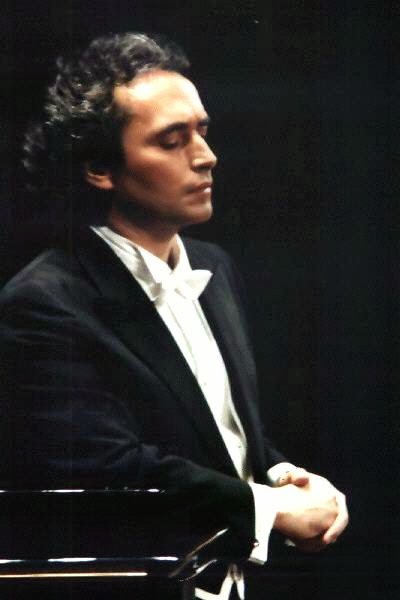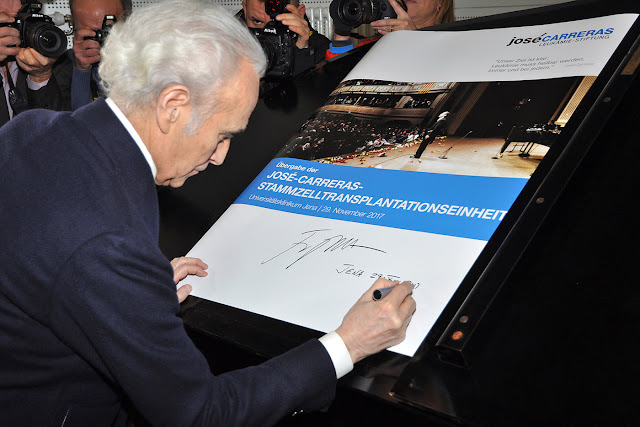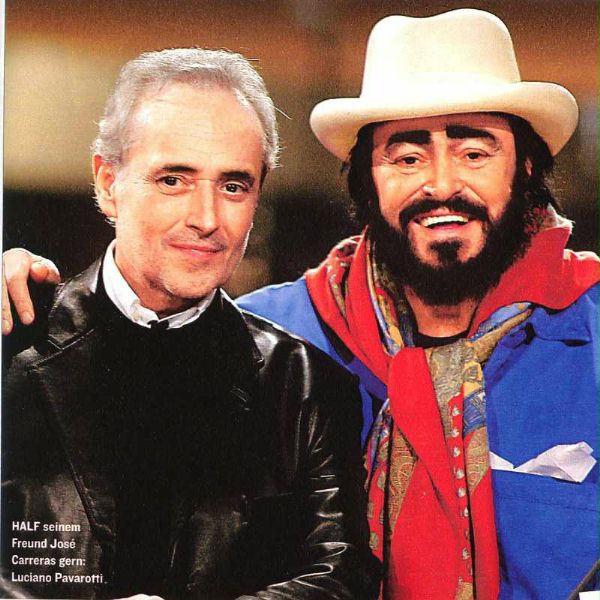"Il Video della Settimana": Josep Carreras sings "Vorrei morire" by Francesco Paolo Tosti (Recital Liceu, 1983)
Benvenuti a un nuovo Video della Settimana.
Dopo l'irrinunciabile post per La Bohème vorrei approfittare per recuperare un anniversario importante che si è celebrato durante le Feste appena trascorse, negli ultimissimi giorni del 2013. Passeremo da un'occasione operistica ad una di recital senza bisogno di mutare palco e città. Il 26 dicembre del 1983 Josep Carreras offriva uno straordinario recital al Gran Teatre del Liceu di Barcellona, a pochissimi giorni dal suo debutto nel ruolo del profeta di Hérodiade insieme a Montserrat Caballé e Juan Pons: poche settimane fa ne ricorreva quindi il trentesimo anniversario, e mi chiedevo come sarebbe stato celebrare le feste in quel modo, assistendo ad un recital di questo tipo... so che alcuni di voi erano presenti quella sera e sanno cosa si prova a chiudere in grande stile il giorno di Santo Stefano, o come era successo quattro anni prima, sanno che significa assistere al debutto di Josep Carreras in Andrea Chénier, lo stesso giorno di Natale. Quanta sana invidia.
Era il suo regalo di Natale per il pubblico di un teatro nel quale aveva debuttato, di lì a pochi giorni, venticinque anni prima, a soli 11 anni, nel Retablo de Maese Pedro di Manuel De Falla diretto da José Iturbi, in cui allora si esibiva nella pienezza delle sue facoltà.
Il titolo dell'articolo del grande critico Xavier Montsalvatge che lo recensiva su La Vanguardia recitava le seguenti parole, "Josep Carreras: apoteósico recital de un ídolo", sottolineando il clima di euforia in cui si era svolto il recital, anche trasmesso in diretta sia dalla Televisione Catalana, sia dalla Radio Nacional de España. Carreras è stato affiancato dal solo Maestro Vincenzo Scalera al pianoforte: diversamente dalle recite operistiche, dove ci sono costumi, scenografie per farsi scudo, nel recital il cantante viene spogliato di tutto questo e, accompagnato dal solo pianista, deve trovare la concentrazione necessaria per far fronte ad un programma, come in questo caso, estremamente ricco e vario, nutrito di compositori, brani, stili e lingue diverse. Le continue risposte entusiastiche del pubblico hanno indotto il tenore a prolungare vistosamente la durata ufficiale con una lunga sequenza di encores, addirittura nove, fino allo strenuo delle energie.
Da questo programma così denso, tra le arie d'opera, romanze, zarzuela e canzoni popolari oggi vorrei proporvi un pezzo di un compositore per il quale Carreras ha sempre mostrato una spiccata predilezione, includendo molte delle sue creazioni nel repertorio, tanto da recital come da concerto: avrete sicuramente intuito che mi riferisco a Francesco Paolo Tosti, e questo frammento, benché molto famoso, forse non è tra i più celebri che si è soliti associare al nostro tenore, probabilmente perché eseguito più di rado. Non per questo non è degno di elogio, anzi a maggior ragione vorrei portarlo alla vostra attenzione, perché ho una vera passione per questo brano.
Il titolo, Vorrei Morire, non è certo dei più allegri ma questo non deve preoccupare affatto: composta nel 1878 si tratta di una lirica di ispirazione inglese, come attesta il sottotitolo "Ricordo di Londra - The Guards Waltz". Nonostante Tosti abbia sempre fatto riferimento a grandi nomi della poesia italiana e straniera per i suoi testi, quali Gabriele D'Annunzio, Giosuè Carducci, Victor Hugo o Paul Verlaine, questa lirica è opera di un poeta che pochi ricordano, Leonardo Cognetti: come suggerisce il titolo, il tema dominante è quello della morte, evocato in luce romantica e addolcito dal tepore di un tramonto di primavera. La musica culla i versi poetici con un accompagnamento molto originale e di gran gusto.
Con questi presupposti, questa lirica non può che raggiungere un risultato straordinario con Josep Carreras. In questo momento della sua carriera poi, il dominio della voce, più bella che mai, era magistrale e, unito ad un grande controllo tecnico, andavano a sommarsi ad un'anima che ogni artista sognerebbe di avere, in grado di un'incredibile capacità espressiva, completa sincerità e abbandono emotivo totale ma mai esagerato. Notevole anche l'abilità virtuosistica, senza la minima esitazione, di alternare le note più ferme e poderose alle sfumature squisitamente liriche, come i pianissimi e la mezza voce che ritroviamo in questo brano.
Vorrei morire contrappone ad una strofa solenne e più severa un ritornello più tenue, dipinto dei colori della stagione che rievoca, quella più auspicabile per lasciare questo mondo, ben diversa dal tempestoso inverno che renderebbe la morte davvero temuta: Carreras rende ogni sfumatura melodica con l'eleganza fraseggio ed il ricorso alle squisite mezze voci che da sempre contribuiscono a renderlo unico e speciale. Mi auguro che la sua resa straordinaria possa farvi innamorare anche di questo brano per cui, ripeto, ho un debole particolare. Lo trovate al minuto 7:24, dopo la bellissima Non t'amo più, sempre di Tosti. Godetevelo!!
.
Il titolo, Vorrei Morire, non è certo dei più allegri ma questo non deve preoccupare affatto: composta nel 1878 si tratta di una lirica di ispirazione inglese, come attesta il sottotitolo "Ricordo di Londra - The Guards Waltz". Nonostante Tosti abbia sempre fatto riferimento a grandi nomi della poesia italiana e straniera per i suoi testi, quali Gabriele D'Annunzio, Giosuè Carducci, Victor Hugo o Paul Verlaine, questa lirica è opera di un poeta che pochi ricordano, Leonardo Cognetti: come suggerisce il titolo, il tema dominante è quello della morte, evocato in luce romantica e addolcito dal tepore di un tramonto di primavera. La musica culla i versi poetici con un accompagnamento molto originale e di gran gusto.
Con questi presupposti, questa lirica non può che raggiungere un risultato straordinario con Josep Carreras. In questo momento della sua carriera poi, il dominio della voce, più bella che mai, era magistrale e, unito ad un grande controllo tecnico, andavano a sommarsi ad un'anima che ogni artista sognerebbe di avere, in grado di un'incredibile capacità espressiva, completa sincerità e abbandono emotivo totale ma mai esagerato. Notevole anche l'abilità virtuosistica, senza la minima esitazione, di alternare le note più ferme e poderose alle sfumature squisitamente liriche, come i pianissimi e la mezza voce che ritroviamo in questo brano.
Vorrei morire contrappone ad una strofa solenne e più severa un ritornello più tenue, dipinto dei colori della stagione che rievoca, quella più auspicabile per lasciare questo mondo, ben diversa dal tempestoso inverno che renderebbe la morte davvero temuta: Carreras rende ogni sfumatura melodica con l'eleganza fraseggio ed il ricorso alle squisite mezze voci che da sempre contribuiscono a renderlo unico e speciale. Mi auguro che la sua resa straordinaria possa farvi innamorare anche di questo brano per cui, ripeto, ho un debole particolare. Lo trovate al minuto 7:24, dopo la bellissima Non t'amo più, sempre di Tosti. Godetevelo!!
.
Spero abbiate apprezzato la mia proposta di oggi. L'appuntamento è per domenica prossima con un nuovo video. Buona settimana a tutti!!
Key facts:
Welcome to a new Video of the Week .
After the post for La Bohème that I could not really avoid writing, I would like to take this opportunity to retake an important anniversary that was celebrated during the Christmas Holidays, in the latest days of 2013. We will pass then from talking about opera to recitals without changing the stage and the city. On 26 December, 1983 Josep Carreras offered an extraordinary recital at the Gran Teatre del Liceu in Barcelona, just a few days before his debut in the role of prophet in Hérodiade together with Montserrat Caballé and Juan Pons: a few weeks ago was the thirtieth anniversary of it, and I was wondering how it would have been celebrating the holidays in this way, by attending a recital of this kind... I know that some of you was there that night and that know how it feels to celebrate Boxing Day like that, or how it had happened four years earlier, they know what experiencing the debut of Josep Carreras in Andrea Chénier on Christmas Day really means. What a healthy envy for all of them.
It was his Christmas gift towards the audience of an Opera House in which he had made his debut, in a few days, twenty-five years earlier, aged 11, in El Retablo de Maese Pedro by Manuel De Falla, conducted by José Iturbi, and now he was performing in the fullness of his powers.
The title of the article by the great critic Xavier Montsalvatge on the catalan newspaper, La Vanguardia, reported the following words, "Josep Carreras: an idol's apotheosis recital" emphasizing the climate of collective euphoria and excitement in which the recital developed, also broadcast live by both the Catalan Television and the Spanish National Radio. Carreras was accompanied only by pianist Maestro Vincenzo Scalera: unlike opera, where there are costumes, particular stage setting to get the shield, in the recital the singer is stripped of all of this and, accompanied only by a pianist, he must find the concentration required to the face a program, as in this case, extremely rich and varied, that deals with so many different composers, songs, styles and languages. The continued enthusiastic responses of the public led the tenor to visibly extend the official duration with a long sequence of encores, nine encores, as long as there was energy left.
From such a dense program, in which we find opera arias , zarzuela and popular songs, today I would like to offer you a piece by a composer whom Carreras has always shown a marked predilection for, including so much of his music in his repertoire, both recitals and concerts: you'll surely guessed that I am referring to Francesco Paolo Tosti , and this fragment, although very famous, is perhaps not the ones we would associate most to our tenor, probably because he used to performed it with less frequency than other songs. This does not mean it is not worthy of praise, so I would like to bring it to your attention even more, because I have a real passion for this piece.
The title, Vorrei Morire,(I would rather die) is not exactly among the most cheerful ever, but this should not worry at all: it was composed in 1878, and is of English inspiration, as revealed by the English , as evidenced by the subtitle "Ricordo di Londra (Memory from London) - The Guards Waltz". Despite Tosti has always referred to the greatest figures of Italian and foreign poetry for his music, such as Gabriele D' Annunzio, Giosuè Carducci, Victor Hugo and Paul Verlaine, this poem is the work of a poet we can hardly remember, Leonardo Cognetti: as the title reveals, the main topic is death, evoked in a typically romantic atmosphere and softened by the warmth of a spring sunset. The music cradles the poetic verses with a very original and great taste accompaniment.
The title, Vorrei Morire,(I would rather die) is not exactly among the most cheerful ever, but this should not worry at all: it was composed in 1878, and is of English inspiration, as revealed by the English , as evidenced by the subtitle "Ricordo di Londra (Memory from London) - The Guards Waltz". Despite Tosti has always referred to the greatest figures of Italian and foreign poetry for his music, such as Gabriele D' Annunzio, Giosuè Carducci, Victor Hugo and Paul Verlaine, this poem is the work of a poet we can hardly remember, Leonardo Cognetti: as the title reveals, the main topic is death, evoked in a typically romantic atmosphere and softened by the warmth of a spring sunset. The music cradles the poetic verses with a very original and great taste accompaniment.
Considering these assumptions, this song can achieve only extraordinary results with Josep Carreras. At this time in his career then, his masteful domain of the voice, more beautiful than ever, with a great technical control, were added up to such a soul that every artist would dream of, capable of an incredible expressivity, full sincerity and total emotional devotion but never exaggerated. Also notable is his virtuosism, without the slightest hesitation, in alternating full notes and exquisitely lyrical nuances, such as pianissimo and mezza voce that we find in this very song too.
Vorrei Morire opposes a solemn, severe verse to a more tenuous chorus, painted with the typical colors of the season it evokes, the more desirable to leave this world , very different from the stormy winter that would make death really feared.
Carreras renders every melodic nuance with his elegant phrasing and the use of exquisite mezza voce that always make him so unique and special. I hope that his outstanding rendition will make you fall in love with this song as well, as, I repeat, I have a particular weakness for it. You will find it at minute 7:24, after the beautiful Non t'amo più, by Tosti as well. Enjoy it!!
I hope you have appreciated my proposal of today. See you next Sunday with a new video. Have a nice week!
Carreras renders every melodic nuance with his elegant phrasing and the use of exquisite mezza voce that always make him so unique and special. I hope that his outstanding rendition will make you fall in love with this song as well, as, I repeat, I have a particular weakness for it. You will find it at minute 7:24, after the beautiful Non t'amo più, by Tosti as well. Enjoy it!!
I hope you have appreciated my proposal of today. See you next Sunday with a new video. Have a nice week!





Comments
Post a Comment
Recent comments